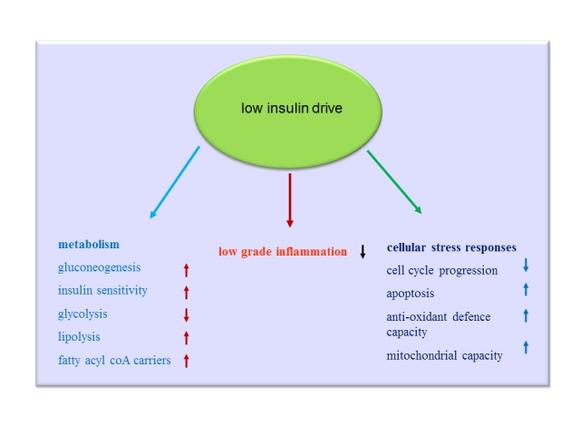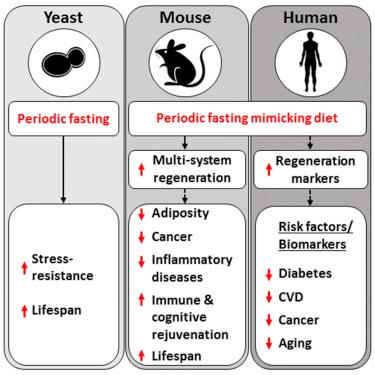Last week I had nothing but a teaspoon of coconut oil for 4 days. My friends and family were not all that surprised to see me do some weird protocol again. It's not just me being a goofball though. Fasting could potentially:
- Reduce cancer risk
- Reduce risk of mental disease
- Increase lifespan
- And much more
I have been fasting for 16 hours a day for years now (see this post). The reason I do it is simple: I potentially gain a lot in the long term (see Ageing Research Reviews), and I lose nothing in the short term. In fact even if it doesn't affect my lifespan, the convenience of not having to worry about food all day is great for productivity and peace of mind.
The short version
Fasting means not eating. Not eating means lower glucose and higher ketones in the blood. Low insulin & high ketones makes weak cells repair or kill themselves.
See this image from Insulin, IGF-1 and longevity

I chose to do a strict interpretation of the fasting mimicking diet which potentially has a whole host of benefits (see Cell Metabolism):

As you can read below, evidence for the benefits is not conclusive and mostly studied in animals. My choice was simple though:
- If it works I reduce my risk of many diseases
- If it doesn't I'm training my willpower
My specific protocol
I've done this twice now. It allows me to reach 1 mmol of ketones within 24h and 4 to 5 mmol by the 105h mark.
- First 24h no food
- 24h-72h I'm allowed one/two teaspoon of coconut oil per day
- 72h-105h I'm allowed two/four teaspoon of coconut oil per day
I use coconut oil because it is high in medium chain triglycerides which the body can easily transform into ketones.
For measuring blood glucose and ketones I use the Freestyle Optium Neo. Note that you need to buy ketone strips separately.
Fasting research in Animals shows benefits
Fasting research has traditionally been done on animals like rats and flies.
Research on IF benefits goes back decades
In 1928 fruit flies were fasted intermittently to study their lifespan (see Journal of Experimental Biology). In 1947 rats on an omnivorous diet were found to benefit from intermittent fasting (see Journal of Nutrition), seemingly inline with similar research from 1945 (see Journal of Nutrition, see Google Scholar for more).
More recent studies try to find out why
More recently there have been numerous studies showing benefits to all sorts of systems like the cardiovascular system, nervous system, metabolic system and inflammation function in all sorts of animals from rats (The Journal of Nutritional Biochemistry, Circulation journal, FASEB)to rabbits (FEBS, Journal of Molecular and Cellular Cardiology).
Conclusion: there are many benefits in animals
From this American Society for Clinical Nutrition 2007 review of historical papers:
The findings in animals suggest that ADF [alternate day fasting] may effectively modulate several risk factors, thereby preventing chronic disease.
Caloric restriction has been widely reviewed now to have benefits, as per this 2012 Ageing Research Reviews paper:
Laboratory survival experiments have shown that dietary restriction (DR) can increase median and maximum lifespan.
Meaning that eating less increases average lifespan as well as increasing the highest reached lifespan.
Not only that but from this 2003 PNAS study:
ADF may modulate disease risk to an extent similar to that of CR [caloric restriction]
and
Intermittent fasting therefore has beneficial effects on glucose regulation and neuronal resistance to injury in these mice that are independent of caloric intake.
In other words, intermittent fasting might have the same effects as caloric restriction, without having to eat less!
Fasting research in humans
Research in humans is often focussed on biomarkers rather than lifespan-long studies. For example a study might find that fasting reduces fasting insulin levels, which might increase lifespan. The reality is that studying a human for a full lifespan is difficult and expensive (and rarely ever done). The research that has been done though is promising.
Quite a lot of research is done into caloric restriction, e.g. not eating too much. See for example the study Biomarkers of Caloric Restriction May Predict Longevity in Humans) in Science and Effect of 6-Month Calorie Restriction on Biomarkers of Longevity ... in JAMA.
Lifespan vs Healthspan
The research can be divided up into two areas of interest for humans:
- Can fasting make you live longer (lifespan)
- Can fasting keep you healthy for longer (healthspan)
Ideally it would influence both of course, and most of the effects actually do. The lifespan effects below for example while possibly extending life also decrease risk for common age related diseases like diabetes.
Research for both is again mostly done by use of biomarkers and genetic activity measurements.
Lifespan: Role of insulin sensitivity
There has been no hard link, but there are signs pointing in the direction that good insulin sensitivity and glucose may increase lifespan.
Insulin is the hormone that helps the body regulate blood glucose (blood sugar) levels. It appears that centenarians (100+ old people) have higher insulin sensitivity (see American journal of Physiology):
our study demonstrates that centenarians compared with aged subjects had a preserved glucose tolerance and insulin action.
Other studies seem to confirm this (see Experimental Gerontology):
C [centenarians] has a lower degree of IR [insulin resistance] and a preserved beta-cell function in comparison to nC [non centenarians]
The children of centenarians also exhibit good glucose metabolism also (see Journal of the American Geriatrics Society):
the offspring of nonagenarian siblings showed a lower prevalence of metabolic syndrome and better glucose tolerance than their partners, centralising the role of favourable glucose metabolism in familial longevity
Interestingly for us fasting seems to promote good glucose metabolism (see Journal of Applied Physiology):
intermittent fasting increases insulin-mediated glucose uptake rates
Additionally intermittent fasting seems to have similar effects to caloric restriction on insulin (see Translational Research):
Results reveal superior decreases in body weight by CR vs IF/ADF regimens, yet comparable reductions in visceral fat mass, fasting insulin, and insulin resistance
A little note: insulin, glucose and the surrounding system are quite complex. There are many regulating elements like for example adiponectin that influence the sensitivity of the rest of the system.
Lifespan: Role of FoxO
To quote Insulin, IGF-1 and longevity and Stressing the role of FoxO proteins in lifespan and disease:
Members of the class O of forkhead box transcription factors (FoxO) have important roles in metabolism, cellular proliferation, stress tolerance and probably lifespan.
and
Class O forkhead box transcription factors (FoxOs) may act as a “master-switch” to adapt cells and organisms to food shortage and ensure metabolic stability under conditions of food shortage and thus opposes many of insulin functions
When humans fast we start burning the fat that our body has stored. This causes stress in our cells (see Insulin, IGF-1 and longevity):
lipids are highly susceptible to oxidative damage, especially the unsaturated fatty acids, due to their readily oxidisable double bonds. Lipid peroxidation causes structural damage
While this sounds bad, the body buffers this by telling cells that can't take the pressure either repair (through autophagy) or to kill themselves (through apoptosis).
Again from Insulin, IGF-1 and longevity:
FoxO activity can also shift the cellular response from survival towards apoptosis
and
Besides protection against oxidative stress, cellular defense mechanisms associated with reduced IIS activity include enhancement of autophagy
Lifespan: Role of IGF-I
One potentially important factor in ageing is the activity of Insulin-like growth factor 1 (IGF-1) hormone. In many animals lowering IGF-1 seems to have life-extension benefits (see Ageing and Disease Journal).
In worms:
In the roundworm Caenorhabditis elegans, single mutations that diminish insulin/IGF-1 signaling can increase lifespan more than twofold and cause the animal to remain active and youthful much longer than normal
In fruit flies:
substantial increases in lifespan are associated with mutations that reduce insulin/IGF-1 signaling in the fruit fly Drosophila melanogaster
In mice:
In several mouse models, mutations that are associated with decreased GH/IGF-1 signaling or decreased insulin signaling have been associated with enhanced lifespan.
In humans:
studies on the genetic and metabolic characteristics that are associated with healthy longevity and old age survival suggest that the conserved ancient IIS pathway may also play a role in human longevity
Note that in humans research results have been complex and conflicting. We're not sure exactly how IGF-1 fits into longevity. From the same analysis as above:
results from human studies have been conflicting and controversial
Healthspan: Cardiovascular health
Intermittent Fasting seems to lower risk factors for heart diseases. From a study on obese women (see Nutrition Journal):
findings suggest that IF combined with CR and liquid meals is an effective strategy to help obese women lose weight and lower CHD risk.
A weight loss oriented study in Nutrition & Metabolism found similar results:
These findings suggest that IFCR with a liquid diet favorably modulates visceral fat and adipokines in a way that may confer protection against CHD [coronary heart disease].
A randomised trial in the International Journal of Obesity found similar results:
experienced comparable reductions in leptin, free androgen index, high-sensitivity C-reactive protein, total and LDL cholesterol, triglycerides, blood pressure and increases in sex hormone binding globulin, IGF binding proteins 1 and 2
Healthspan: Nervous system
A healthy brain when getting older would be nice. As it turns out here intermittent fasting too has great effects (see Ageing Research Reviews):
caloric restriction (CR) and intermittent fasting (IF), can prolong the health-span of the nervous system by impinging upon fundamental metabolic and cellular signaling pathways that regulate life-span
Research in humans is more sparse, but rodents are giving us helpful clues. See:
- Neuroprotective role of intermittent fasting in senescence-accelerated mice P8
- Dietary restriction started after spinal cord injury improves functional recovery
- Intermittent food deprivation improves cardiovascular and neuroendocrine responses to stress in rats
- Intermittent fasting dissociates beneficial effects of dietary restriction on glucose metabolism and neuronal resistance to injury from calorie intake
- Caloric restriction and intermittent fasting: Two potential diets for successful brain aging
Relation between fasting & the ketogenic diet
When fasting, the body creates energy from stored fat. This is very similar to the Ketogenic diet where you eat mostly fat. Both will get your body into ketosis, a state where the body relies on low blood sugar and high blood ketones for energy.
For those among you who already know about the ketogenic diet, These are my blood ketone levels measured while fasting:
- 48h: 1.4 mmol
- 69h: 3.2 mmol
- 92h: 5.1 mmol
- 105h: 4.7 mmol
That is very solidly into nutritional ketosis (which is usually defined as between 1 and 3 mmol, see wikipedia).
Why does this matter? Well, ketosis has many of the benefits of fasting. This post will not dive into the details of ketosis, but see these studies:
- The neuroprotective properties of calorie restriction, the ketogenic diet, and ketone bodies
- A ketogenic diet as a potential novel therapeutic intervention in amyotrophic lateral sclerosis
- Ketogenic Diet Reduces Cytochrome c Release and Cellular Apoptosis Following Traumatic Brain Injury in Juvenile Rats
- Ketogenic diet treatment increases longevity in Kcna1-null mice, a model of sudden unexpected death in epilepsy
- Potential role of polyunsaturates in seizure protection achieved with the ketogenic diet
- Implementing A Ketogenic Diet Based on Medium-chain Triglyceride Oil in Pediatric Patients with Cancer
- Roles of Caloric Restriction, Ketogenic Diet and Intermittent Fasting during Initiation, Progression and Metastasis of Cancer in Animal Models: A Systematic Review and Meta-Analysis
As you can see there is some very interesting research on all sorts of diseases that might benefit from nutritional ketosis. From ALS to epilepsy to cancer.
Note: I'm not saying ketosis or fasting cures any of these. I'm saying there is some interesting research in animals that shows promise of ketosis and fasting combined with traditional therapy.
Multi-day fasting & the Fast Mimicking Diet
Intermittent fasting does not impact a number of things that the ketogenic diet does. For example cancer studies in animals find intermittent fasting ineffective, but the ketogenic diet effective (see PLOS):
Caloric restriction and ketogenic diet are effective against cancer in animal experiments while the role of intermittent fasting is doubtful and still needs exploration. More clinical experiments are needed and more suitable patterns for humans should be investigated.
Fasting does however seem to increase the effectiveness of chemotherapy while reducing side effects, see Fasting Cycles Retard Growth of Tumors and Sensitise a Range of Cancer Cell Types to Chemotherapy:
Short-term starvation (or fasting) protects normal cells, mice, and potentially humans from the harmful side effects of a variety of chemotherapy drugs.
The Fast Mimicking Diet by researcher Valter Longo (see wikipedia) aims to provide people with a way to reap the benefits of a multi-day fast while still being allowed to eat a small amount of specific things. It has some remarkable preliminary results, see for example these papers:
- A Diet Mimicking Fasting Promotes Regeneration and Reduces Autoimmunity and Multiple Sclerosis Symptoms
- Fasting-mimicking diet and markers/risk factors for aging, diabetes, cancer, and cardiovascular disease
- Fasting-Mimicking Diet Reduces HO-1 to Promote T Cell-Mediated Tumor Cytotoxicity
- A Periodic Diet that Mimics Fasting Promotes Multi-System Regeneration, Enhanced Cognitive Performance, and Healthspan
Conclusion: Possibly many benefits, no downside
Human research is expensive, and not a lot of long term studies have been done. Most likely not very many will be done at all. After all, there is very little money to be made from telling people not to eat.
The research that has been done though all seems very favorable, showing short term benefits and effects that may result in great long term effects.
Since there seem to be no downsides to doing this (including no loss of muscle mass, see European Journal of Sport Science) it is a no brainer for me.
